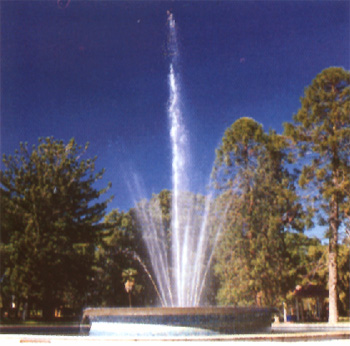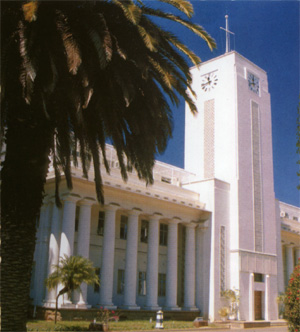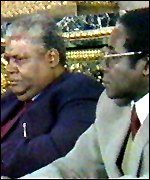

After the decline of Great Zimbabwe, which had begun in the 13th century, the fragmented Shona tribes allied themselves and created the Rozwi state and encompassed over half of present day Zimbabwe. This state lasted until 1834 when it was invaded by Ndebele warriors and came under the rule of Lobengula. Lobengula soon found himself having to deal with Cecil Rhodes and the British South Africa Company (BSAC) and signed a contract giving up mineral rights to his land in exchange for guns, ammunition and money. A series of misunderstandings followed this agreement and the Ndebele found themselves fighting the BSAC. British Settlement And Administration In 1888, Cecil Rhodes obtained a concession for mineral rights from local chiefs. Later that year, the area that became Southern and Northern Rhodesia was proclaimed a British sphere of influence. The British South Africa Company was chartered in 1889, and the settlement of Salisbury (now Harare, the capital) was established in 1890....
"The Path of blood" the first King of the Matebele was the son of Matshobana, son of Mangete, son of Ngululu, son of Langa, son of Zimangele; all descendants of the Khumalo Dynasty. Mzilikazi was born of Cikose Ndiweni the daughter of Chief Ndlovu Ndiweni of the aMangwe people (tribe). After the murder of Matshobana, who was one of chiefs of the Khumalo clan, Mzilikazi inherited the chieftainship, and had to live at King Tshaka's Bulawayo. Before Tshaka's reign there was Zwide's Ndwandwe tribe. Trouble started for Mzilikazi for when he suspected that Zwide, who had had his father Mzilikazi assassinated, wanted him killed. In preparation alliance with Tshaka, which allowed him to be a leader of one of his regiments. Mzilikazi's reputation, bravery and skill in combat grew, much to the displeasure of King Tshaka. King Tshaka saw Mzilikazi as a future potential threat and therefore hatched a plot to get rid of Mzilikazi. Unfortunately for King Tshaka, his plot did not produce his desired results. Mzilikazi then decided to setup his own kingdom. With nothing more than five hundred men and women, Mzilikazi departed from King Tshaka's Zululand, by this time Mzilikazi was already had three sons, but none of these could be the heir to the throne. In accordance with Ndebele customs, successors to the throne could not come from children the Mzilikazi bore before he was King. Thus Nkulumane was the heir. Meanwhile on learning of Mzilikazi exodus, King Tshaka sent two army contingents to stop him....

On the remains of King Lobengula's capital rose the present multi-ethnic City of Bulawayo with its wide tree-lined roads (the original streets of Bulawayo were constructed so as to allow a team of sixteen oxen to make a full turn), and a distribution of skyscrapers. Present day Bulawayo, is clearly unrecognizable from King Lobengula's capital, as it bares no resemblance. In 1894 a town of a gridiron pattern was taking shape, and officially, Bulawayo was given it town status in the same year by administrator Leander Starr Jameson , when he declared the settlement a town. In 1897 Bulawayo acquired a municipal status. The first train arrived in Bulawayo in 1897, Bulawayo grew to become an important industrial hub of Southern Rhodesia (now called Zimbabwe). Many heavy industrials were located in the town. The town was a gateway to south Southern Africa - linking the north and south through a rail and road network. The Bulawayo City Council was the first in Southern Rhodesia to establish a viable African Advisor Board and went further to establish home ownership schemes for Africans, being the first local authority to do so. It was the first to embark on a planned programme of water supply; the first to provide educational facilities before there was any national policy or the subject; and led in having a progressive low-cost housing programme and a comprehensive social development blueprint.
 Modern day Zimbabwe is not without its own heroes emanating from the City of Kings: namely Dr Joshua M. Nkomo, the late Vice President; Jason Z. Moyo; Lookout Masuku, the late ZIPRA Commander and many, many more children of the soil...
To email author:
Modern day Zimbabwe is not without its own heroes emanating from the City of Kings: namely Dr Joshua M. Nkomo, the late Vice President; Jason Z. Moyo; Lookout Masuku, the late ZIPRA Commander and many, many more children of the soil...
To email author: